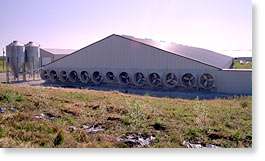|
Good morning. I appreciate the chance to be here today, participating in the public debate on an issue as important as this. My name is Bryce Oates, and I’m from Callaway County. I’m here today representing the Missouri Rural Crisis Center and our 5,500 farm and rural family members in the state. We urge you to reject SB 1128. We believe that Senate Bill 1128 is, first and foremost, corporate agribusiness’s attempt to stifle the democratic process. The bill puts roadblocks in place of two key tools currently available to Missouri citizens to impact the future of their local communities:
Unlike diversified family farms, industrial livestock operations -- defined as CAFOs -- concentrate hundreds and thousands of animals in confined facilities. This concentrates livestock manure into such a small geographical area that these facilities threaten the air, water and soil in the areas where they operate. Many of the public health impacts have been well-documented:
These facts and others demonstrate that CAFOs are a real public health issue for rural counties. Some self-proclaimed leaders of the industry -- who do not represent the best interests of family farmers -- will attempt to convince you that by allowing citizens and local units of government the ability to know and provide adequate protection for their community when these industrial operations are proposed is a detriment to the agricultural economy. However, the biggest bang for our buck is to support independent family farm livestock production in Missouri versus fostering further industrialization and corporate concentration of the industry.
It does not make sense for rural citizens to be kept in the dark when an industrial operation that can have serious health, environmental and economic impacts is being proposed in their communities. And, it doesn’t make sense to place roadblocks in the way of counties who want to take pro-active positions that will minimize the likelihood for long-term damage to the health and welfare of their citizens. Local control is a hallmark of our democracy. We have to protect that right in order to have a system of accountability to Missouri’s rural citizens. What does make sense is for the leaders of our great state to join together with family farmers to work for fair and competitive markets instead of simply providing political cover for further corporatization and concentration of agriculture. Again, we urge you to reject SB 1128. The future of our rural communities, agricultural economy and the environment depends on it. Published in In Motion Magazine, February 21, 2004 |
||||||||||||||
If you have any thoughts on this or would like to contribute to an ongoing discussion in the  What is New? || Affirmative Action || Art Changes || Autonomy: Chiapas - California || Community Images || Education Rights || E-mail, Opinions and Discussion || En español || Essays from Ireland || Global Eyes || Healthcare || Human Rights/Civil Rights || Piri Thomas || Photo of the Week || QA: Interviews || Region || Rural America || Search || Donate || To be notified of new articles || Survey || In Motion Magazine's Store || In Motion Magazine Staff || In Unity Book of Photos || Links Around The World || OneWorld / US || NPC Productions Copyright © 1995-2011 NPC Productions as a compilation. All Rights Reserved. |
||||||||||||||



